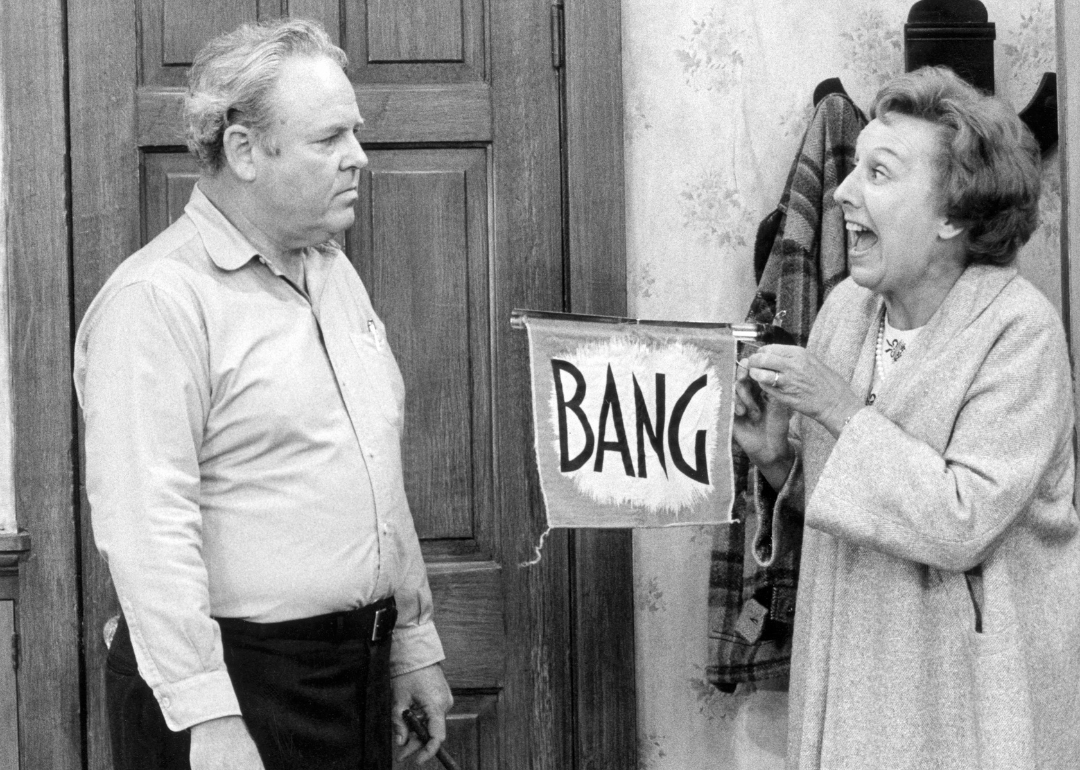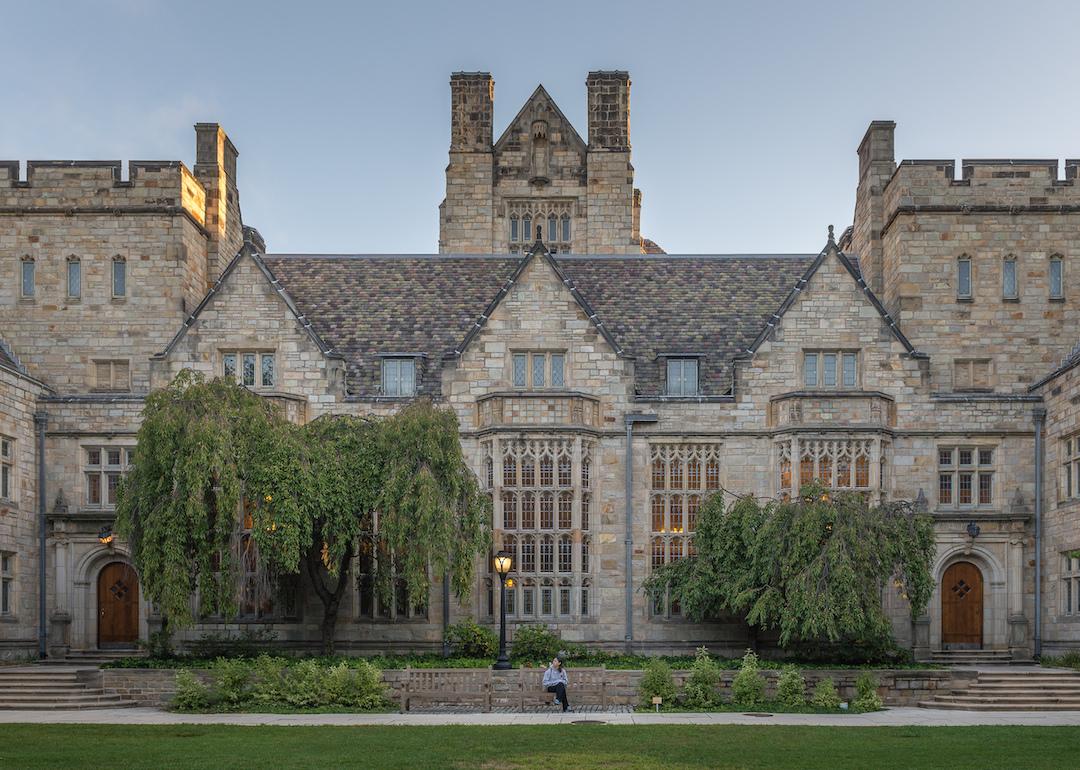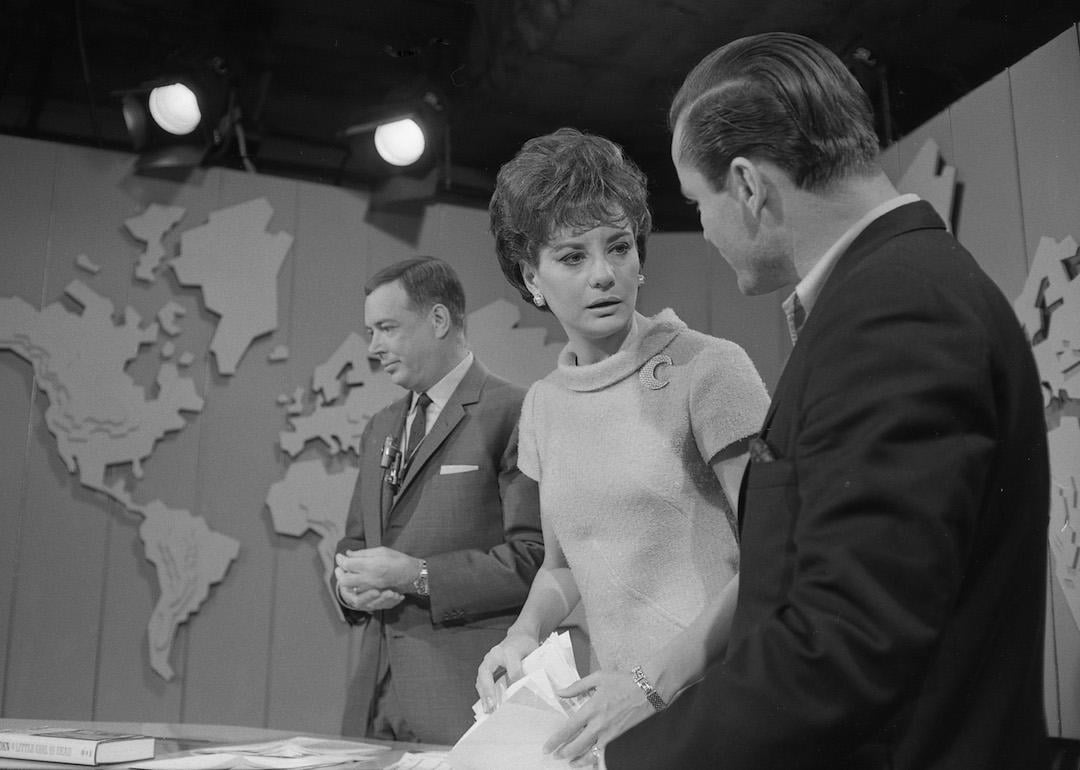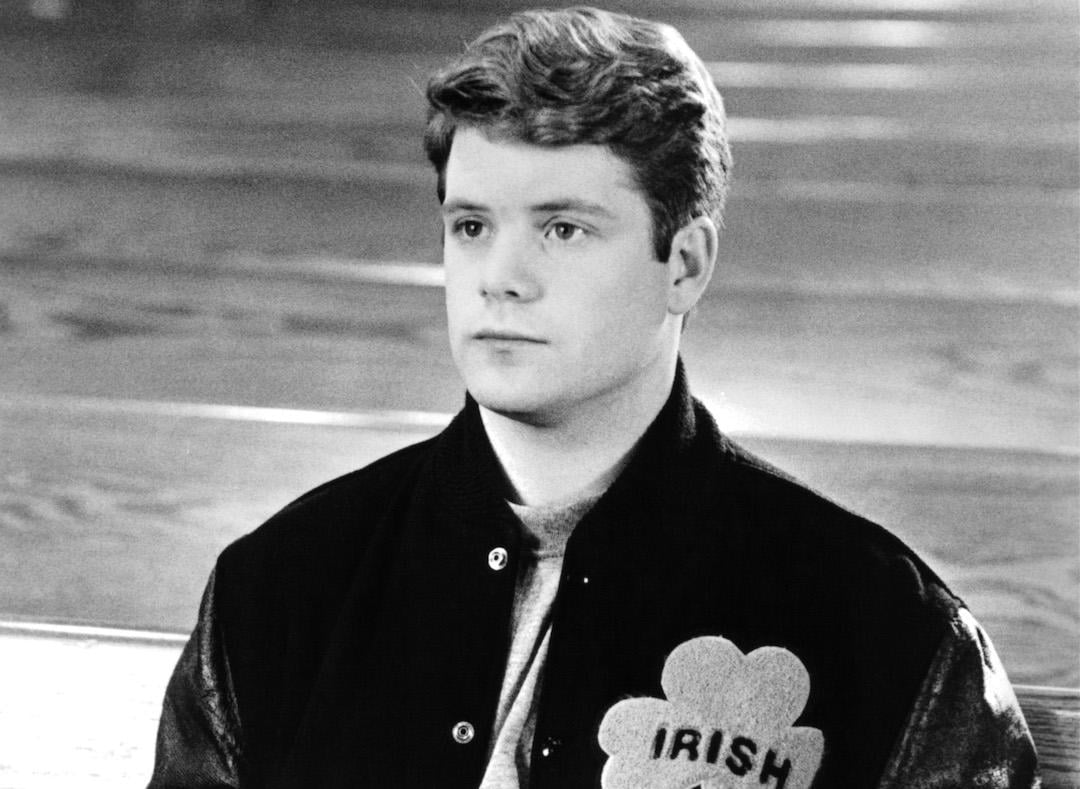
Sitcom history from the year you were born
Sitcoms have changed so much over the years amid shifting styles, audience tastes, and improvements in technology. They can be a reflection of what is happening in the world, a unique parallel to the most significant events and movements in history.
The sitcom is a shortened version of the term "situation comedy" and found its origins in radio. Though the first television sitcom aired in 1946, Merriam-Webster dates the first known use of the word to 1956. Sitcoms revolve around a fixed set of characters, with situations carrying over or continuing from week to week, and usually foreground their comedic elements.
Stacker looked at various entertainment news sources including The Hollywood Reporter, Variety, The New York Times, The Washington Post, and IMDb to gather information about the history of sitcoms from the year you were born. The years range from the sitcom's beginnings in 1945 until the present day, and include debuts, series finales, and important and interesting facts about one of the most relevant genres in the history of television.
Do you remember your favorite sitcom? Maybe you watched it with your parents or a college roommate. Perhaps there is one episode that you'll never forget, or maybe it's a famous line or a catchy theme song, or maybe the death of a beloved character.
Whether you were born when the first same-sex marriage on television took place, the most-watched season finale aired, or the first time that the wage gap between the sexes was addressed—no matter what decade or season, we've got you covered.
Join Stacker as we take a stroll down memory lane, back to the year of your birth, to explore the most fascinating, profound, hysterical, and unforgettable moments in sitcom history.
1945: The end of radio's Golden Age sets stage for television
Commercial television found its beginnings in 1945, which meant big changes for radio, the primary entertainment medium up to that point. Radio shows would begin transitioning to television, including situation comedies. By the beginning of the next decade, television would become a lucrative and ultimately unstoppable medium.
1946: The world's first television sitcom airs
The 30-minute show "Pinwright's Progress," about a store proprietor's many misadventures, aired on the British Broadcasting Corporation (BBC). The very first sitcom hit the small screen on Nov. 29, 1946. Though the BBC aired a full season made up of 10 episodes, the sitcom was broadcast live, predating television's ability to preserve broadcasts, so no episodes survived.
1947: The first American sitcom airs
"Mary Kay and Johnny," the first American sitcom, centered on a young married couple in New York (real-life married couple Johnny and Mary Kay Stearns). The 15-minute weekly show, which aired on Nov. 18, 1947, was performed live for a studio audience. It was also the first show to feature a married couple sharing a bed and a pregnant woman on television—though the pregnancy remained hidden, and the birth was later written into the show.
1948: A sitcom features the first African American actress in a recurring role
"The Laytons" starred Amanda Randolph and ran on the now-defunct Dumont Television Network from Aug. 1948 to Oct. 1948. Randolph was the first African American actress who appeared in a recurring role on a sitcom.
1949: The first Jewish sitcom airs on television
"The Goldbergs" got its start as a radio situation comedy and aired from 1929-1946. It crossed over to television in 1949, where it remained until 1957 thanks to its large and loyal audience.
1950: 'The George Burns and Gracie Allen Show' offers sitcom/variety hybrid
On October 12, George Burns and Gracie Allen brought their radio show "Burns and Allen" to television. The show employed elements of both the sitcom and the variety show, making it an interesting hybrid. Burns was also the first television performer to break the fourth wall and directly address the audience while in the scene.
1951: 'I Love Lucy' is the first show filmed for a live audience
The classic sitcom "I Love Lucy," which premiered in 1951, was not only the first show to be filmed using 35 mm film in front of a live studio audience, but was also the first to use a multi-camera format. And unlike many television shows of the time, the comedy was produced in Hollywood rather than New York.
1952: 'I Love Lucy' created the rerun
The first television rerun came about because of Lucille Ball's pregnancy. Producers shot extra shows to pad the second season but realized they wouldn't have enough before Lucy became unable to perform. They realized they could air older shows again, and the first rerun was the "The Quiz Show," which had originally aired on Nov. 12, 1951.
1953: 'I Love Lucy' is the first show to write a pregnancy into the storyline
After becoming pregnant in real life, Lucille Ball's pregnancy was written into the show's storyline, though the term "expecting" was used instead of the word "pregnancy." It was the highest-rated episode of the series and saw more viewers than either the inauguration of President Dwight Eisenhower or Queen Elizabeth II's coronation. The world met Little Ricky on Jan. 19, 1953, only 12 hours after Lucy gave birth to her son, Desi Arnaz, Jr.
1954: Ozzie and Harriet end their radio sitcom run
One of the first sitcoms to represent the nuclear family on television—and featuring a real-life family—"The Adventures of Ozzie & Harriet" found its start on radio. In 1952, the show made its television debut while simultaneously airing on the radio. In 1954, the television show continued even after the radio show ended, and it remained on the air until 1966, making it the longest-running sitcom until "The Simpsons" surpassed it.
1955: 'The Honeymooners' debuts on Oct. 1
Comedian Jackie Gleason created the show based on a comedy sketch from his variety show. Most of the show unfolded in the Kramdens' kitchen and featured two couples, the Kramdens and the Nortons. Though it only lasted for 39 episodes, it found a cult following thanks to famous catchphrases such as, "To the moon, Alice!" and "Baby, you're the greatest."
1956: The very first major television sitcom character dies
When the television show "Make Room for Daddy" was transitioning to "The Danny Thomas Show," lead actress Jean Hagen left the show because she didn't like the direction of her character. Instead of dealing with the fallout of featuring a divorce between a married couple on television, the writers killed Hagen's character off instead. While she was the first major sitcom character to be killed off, she wouldn't be the last.
1957: 'Leave it to Beaver' featured the first toilet on television
In an episode that featured the Beav hiding a pet alligator in the tank of a toilet, network executives had to break protocol and show not only a bathroom but the toilet itself on TV. The network allowed "Leave it to Beaver" to keep the scene as long as it didn't show the characters actually using the bathroom for its intended purpose. The first series to feature the sound of a toilet flushing wouldn't come until 1971.
1958: 'Donna Reed' becomes the first family sitcom to focus on the mother
For the first time in sitcom history, the 'Donna Reed' show focused not on the father or the kids but on the mother. In 1958, it was a groundbreaking and much-needed concept for the millions of stay-at-home mothers dotting the suburban landscape. It was so mother-centric that it was almost called "Mother Knows Best."
1959: Norman Lear creates his first television show
"The Deputy," starring Henry Fonda, was a Western that ran for two seasons. Lear would move on to create some of the biggest and most thought-provoking sitcoms of the 1970s and '80s, including "All in the Family," "The Jeffersons," and "One Day at a Time."
1960: The first animated sitcom airs on prime-time television
"The Flintstones" debuted on Sept. 30, and many thought it was an animated version of "The Honeymooners," though show creators Willian Hanna and Joseph Barbera didn't agree. The duo, who had a background in animated shorts, wanted a show that appealed to both children and their parents. The sitcom was nominated for an Outstanding Comedy Series Emmy in its first season.
1961: A show about a talking horse debuts in syndication
"Mister Ed" aired in syndication for its first season and on CBS until 1966. Comedian George Burns helped pitch the pilot episode, and Clint Eastwood guest-starred in one episode of the popular sitcom.
1962: Lucille Ball brings divorce to the forefront
Lucille Ball and Desi Arnaz divorced in 1960. On Oct. 1, 1962, Ball's show, "The Lucy Show," premiered. Though the show was based on a book that featured two divorced women living together, the network felt that was too risky, so it made Ball a widow and the friend who lived with her a divorcee.
1963: Viewers discover how Beaver Cleaver got his nickname
The final episode of" Leave It to Beaver" ("Family Scrapbook") found the family looking at an old photo album and reliving old memories. They discuss the titular character's nickname and how it came about. When Beaver's older brother Wally was little, he couldn't say "Theodore," so instead, he called him Tweeter, which eventually became Beaver.
1964: An unlikely group of people are shipwrecked on an island
"Gilligan's Island" debuted on Sept. 26 in the 8:30 p.m. time slot on CBS. The show, created by Sherwood Schwartz, lasted only three seasons, though it gained quite a following in syndication.
1965: A interracial pair of spies come to prime time
"I Spy" is the first sitcom to portray an interracial pair who were equals. It debuted on Sept. 15 and starred Bill Cosby and Robert Culp. Cosby's character was considered the brains, while Culp's character was the playboy.
1966: The first single-girl sitcom airs on television
Marlo Thomas starred as a single woman who moves to New York to become an actress. Though Thomas created the show, she was not credited for it at the time. Her father, Danny Thomas, starred in sitcoms "Make Room for Daddy" and later on the "The Danny Thomas Show" as a widower.
1967: 'The Flying Nun' debuts on ABC
Though Sally Field starred in the 1965 sitcom "Gidget" and loved the experience, the actress wanted nothing to do with playing a nun, especially a flying one. In a 2008 interview with Oprah Winfrey for O, The Oprah Magazine, Field said, "I didn't want to do it. I was trying to figure out who I was, but I knew who I wasn't: a flying nun."
1968: 'Julia' presents a Black female lead in a sitcom
While the show, which first aired on Sept. 17, 1968, presented Diahann Carroll as the female lead and was considered groundbreaking for doing so, many people of color complained that it presented a sanitized view of their lives and was not an accurate portrayal. "Julia" remained on the air until 1971.
1969: 'The Brady Bunch' portrays a large, blended family
On Sept. 26, "The Brady Bunch" debuted and featured a family of eight brought together through a second marriage. Though the show was wholesome and mention was never made of what happened to Carol Brady's first husband, creator Sherwood Schwartz always insisted that Carol was divorced.
1970: A groundbreaking sitcom for women in the workplace debuts
On Sept. 19, "The Mary Tyler Moore Show" would change the face of television for its portrayal of an independent, career-minded, single woman. The show would remain on the air for seven seasons and broach relevant topics like the wage gap between men and women.
1971: 'All in the Family' is the first show to come with a warning
The show debuted in 1971 and came with the following warning: "The program you are about to see is 'All in the Family.' It seeks to throw a humorous spotlight on our frailties, prejudices, and concerns. By making them a source of laughter, we hope to show—in a mature fashion—just how absurd they are." Another Norman Lear show, "Hot l Baltimore," which premiered in 1975, featured a disclaimer before every show due to its controversial content.
1972: 'The Mary Tyler Moore Show' explores the wage gap
In the Season 3 episode "The Good Time News," Mary learns that the male producer who held her job before her was paid more. After confronting her boss, Mary learns that she earns less because she is a woman. She fights back and eventually gets the same amount as her predecessor.
1973: 'M*A*S*H' features male nudity
Season 2, Episode 10, "The Sniper," featured one of the first instances of male nudity in prime-time television in the U.S. The scene reveals Radar's backside when he tries to escape sniper fire by running into the shower tent, and his towel slips.
1974: Lucille Ball ends her long run on CBS
The beloved redhead spent 23 years as a Monday night fixture on the CBS television schedule. Ball informed the network that she would not continue on with her weekly series, "Here's Lucy." The actress ended one of the longest prime‐time runs in television history.
1975: Lieutenant Colonel Henry Blake dies on 'M*A*S*H'
In the Season 3 finale, Lt. Colonel Henry Blake dies when his plane is shot down. The death is not seen; instead, Radar reports to the hospital staff, "Lt. Colonel Henry Blake's plane was shot down over the Sea of Japan. It spun in. There were no survivors."
1976: A sitcom theme song becomes a #1 Billboard hit
The "Welcome Back, Kottter" theme song becomes a #1 pop hit on the Billboard Hot 100. In the year prior, "S.W.A.T." became the first theme song to hit #1 on the pop charts. The ex-Lovin' Spoonful singer John Sebastian wrote and performed the song.
1977: 'Happy Days' jumps the shark
The Season 5 premiere of the popular sitcom featured Fonzie literally jumping over a shark while on water skis in his signature leather jacket. The moment created a term that would become a part of television vernacular. Coined by Jon Hein for his website, "jumping the shark" refers to when a show is unofficially past its prime and does something gimmicky to attempt to win back viewers.
1978: 'Taxi' debuts on ABC
Taxi premiered on Sept. 12, and though it only ran for five seasons, it won 18 Emmys. It also launched several successful careers for many of its stars. Actor Jeff Conaway, arguably the show's biggest star due to his appearance in the movie "Grease," left during the fourth season.
1979: 40.2 million Americans tune in for the "All in the Family" series finale
The sitcom remains one of the top 10 most-watched season finales. The episode focused on Edith pushing herself to cook St. Patrick's Day dinner for Archie's Place, even though the doctor warned her to stay off her feet. When Archie discovers that Edith kept the truth from him, he makes her promise to never do it again, and then Archie tells Edith that he is nothing without her.
1980: Edith Bunker dies on "Archie's Place"
Jean Stapleton, who played Edith, wanted to leave the show, so Edith was already dead in Season 2's opening episode. We discover Archie grieving the death of his wife after she died of a stroke a month prior. In honor of Edith's death, Norman Lear's Tandem Productions started a $500,000 Edith Bunker Memorial Fund supporting the Equal Rights Amendment and women's rights.
1981: The sitcom 'Soap' airs for the last time
'Soap' was a prime-time parody of daytime soap operas and addressed many controversial topics in its four-season run. It was an important stepping stone for Billy Crystal and led to tremendous career success for the actor. The sitcom was written and created by Susan Harris, who would go on to create "The Golden Girls."
1982: 'Cheers' debuts on NBC
The sitcom premiered on Sept. 30 and aired for 11 seasons. Bartenders were replaced, as were lead actresses, but the show consistently received solid ratings. It is considered by many to be one of the greatest sitcoms in television history.
1983: 'M*A*S*H' becomes and remains the most-watched TV series finale
More than 106 million people watched "Goodbye, Farewell and Amen," when it aired on Feb. 28, 1983. The finale wrapped up an 11-season run, and advertising spots airing during the show's final episode sold for a whopping $450,000 for a brief 30 seconds. When the show ended, an estimated 1 million viewers in New York City went to the bathroom, and 6.7 million gallons of water moved through the sewer system.
1984: George Clooney gets his first recurring role
Ironically, megastar George Clooney's first recurring role was on a sitcom called "E/R," where he played an EMT. This role came a decade before he would be cast in the hour-long drama series "ER," where he played Dr. Doug Ross.
1985: 'The Golden Girls' brings life after 50 and marriage to the masses
The show, which premiered on Sept. 14, 1985, featured four women who were either divorced or widowed, navigating aging in a world that wanted to ignore it. Susan Harris, who created and wrote the series, told The New York Times, "There is life after 50. People can be attractive, energetic, have romances." Harris, no stranger to trailblazing, wrote the controversial abortion episode of the 1972 Norman Lear sitcom ''Maude'' and created the sitcoms ''Soap'' and ''Benson."
1986: Shelley Long leaves 'Cheers'
Actress Shelley Long left the show at the end of Season 5 at the height of its popularity. Long wanted to pursue film roles, and her character, Diane Chambers, postpones her wedding to Sam and goes off to write her novel.
1987: 'Designing Women' features a storyline about a character with AIDS
The episode "Killing All the Right People" featured Tony Goldwyn as a man and fellow designer who is dying of AIDS. He asks the women to design his funeral. Producer Linda Bloodworth-Thomason's mother contracted AIDS after receiving an HIV-infected blood transfusion and died shortly before the episode was written.
1988: Roseanne debuts and depicts a real working-class family
On Oct. 18, 1988, Roseanne debuted—and it was a show unlike any of its contemporaries. The honest portrayal of a "just getting by" family was identifiable to many viewers who understood and appreciated the comfortable, lived-in Conner household and the real issues they faced. Roseanne lasted for 10 seasons.
1989: The longest-running animated sitcom debuts
"The Simpsons" debuted on Fox on Dec. 17, 1989, as a Christmas special. The animated sitcom got its start as a cartoon short in 1987 on "The Tracey Ullman Show." Created by cartoonist Matt Groening, it reached its 34th season in 2022.
1990: 'The Fresh Prince of Bel-Air' addresses racism
In the episode "Mistaken Identity," Will and Carlton are pulled over by the police, who assume they stole Uncle Phil's car. Well before Black Lives Matter, "The Fresh Prince of Bel-Air" addressed the racial inequities young Black people face when dealing with law enforcement.
1991: A Fox sitcom features the first same-sex marriage
In the Fox sitcom "Roc," Roc's uncle tells the family he's gay. The episode ends with Roc hosting a wedding for his uncle in his home. It was the first same-sex marriage featured on U.S. television, and other shows like "Friends" and "Roseanne" would follow suit.
1992: Murphy Brown decides to have a child on her own
After Murphy Brown finds out she is pregnant in Season 4, she makes the decision to have the baby on her own and become a single, working mother. At the time, Vice President Dan Quayle voiced his displeasure, stating that the character "mocked" fathers with her decision.
1993: NBC coins the term 'Must See TV'
The term came about during Warren Littlefield's tenure as Entertainment President at NBC. The term branded the network's blockbuster Thursday night lineup, which at various points included "Frasier," "Mad About You," "Friends," "Seinfeld," "Will and Grace," and "ER."
1994: A show about 6 friends takes the world by storm
"Friends" debuted on NBC on Sept. 22, 1994, and would remain on the air for 10 seasons. A pop culture phenomenon, its stars went on to become some of the highest-paid actors in television history. The show about friends living and loving in New York City was co-created by David Crane and Marta Kauffman.
1995: The most famous bachelorette pad in television is crowned
Entertainment Weekly named Mary Richards' apartment from "The Mary Tyler Moore Show" television's most famous bachelorette pad. While Mary lived in an apartment with a fictitious address, the exterior shots of the apartment are from a real Minneapolis home that went up for sale in 2017.
1996: The Conners win the lottery
In the second episode of the ninth and final season of "Roseanne" titled "Millions from Heaven," Roseanne wins $108 million in the lottery, changing everything and creating a very strange final season that would be undone in the series finale. The episode was also the 200th in the series.
1997: Ellen DeGeneres comes out on 'Ellen'
On April 30, 1997, Ellen DeGeneres came out publicly as both her character and herself on "Ellen," the half-hour sitcom she starred in since its beginning in 1994. Though "The Puppy Episode" was a ratings success and a groundbreaking moment, the episode received backlash from religious groups.
1998: 'Seinfeld' ends
The final season of the sitcom about nothing included a finale where the whole group ended up in prison, an episode that many critics and fans disliked. The series, which made household names of its characters and eased its way into pop culture history, lasted nine seasons and began and ended with a discussion about shirt buttons.
1999: Tia and Tamera find out their father is white
Tia and Tamera Mowry reflected their own lives when their characters discover that their father is white on "Sister, Sister." The episode "Father's Day" broached the subject of interracial families, which was something rarely discussed on television in 1999.
2000: 'Freaks and Geeks' is canceled after only one season
The underrated show created by Paul Feig and produced by Judd Apatow lasted only 18 episodes before NBC pulled the plug. The sitcom featured a cast of unknowns, many of whom went on to have successful careers in the industry. It gained cult status after it was canceled, and many fans believed viewers simply weren't ready for such an honest and real look at teenage life.
2001: A Canadian mockumentary sitcom paves the way
When "Trailer Park Boys" premiered in Canada, it featured handheld camera work, confessional-type interviews, and scripted fiction that seemed like candid reporting. It was like watching a funny and clever documentary. Over the years, several British and American sitcoms would emulate the mockumentary style, including "The Office," "Parks and Recreation," and "Modern Family."
2002: '8 Simple Rules' debuts on ABC
The comedy premiered on Sept. 17 and featured John Ritter and Katey Sagal as a married couple raising kids. Before the second season began, John Ritter died, though he had already taped three episodes for the second season.
2003: 'Arrested Development' changes sitcom television
The sitcom, which premiered on Nov. 2, was shot in single-camera format and was unapologetically self-referential. The show was constantly on the sitcom chopping block during its first three seasons and finally got the axe in 2006, only to return to television seven years later.
2004: 'Frasier' ends its long run
After 11 seasons, the "Cheers" spinoff featuring America's favorite psychiatrist, Dr. Frasier Crane, wrapped things up. At one point, star Kelsey Grammer was the highest-paid actor on television. There is talk of a "Frasier" reboot.
2005: 'How I Met Your Mother' premieres on CBS
The show debuted on Sept. 19 and was similar to "Friends" in that it was about a group of friends in their 20s navigating the world in New York City. The interesting twist involved weekly narration from the future, with Ted Mosby telling his children how he met their mother. The question would not be answered, or the mother revealed, until the season finale.
2006: 'That '70s Show' says goodbye
On May 18, after eight seasons, the show officially ended. Both Eric and Kelso had already left Point Place, though both returned home for the series finale. The show ended as the gang headed upstairs to welcome the new decade, and the audience was left with a shot of the empty basement as the New Year countdown is heard from upstairs.
2007: 'The Big Bang Theory' debuts on CBS
The show premiered on Sept. 24 and received both critical and popular acclaim. It wound up becoming the longest-running sitcom, with the airing of its 276th episode beating out "Cheers," which aired 275 episodes in its 11-season run.
2008: Estelle Getty, who played Sophia on 'The Golden Girls,' dies
The actress died on July 22 just three days before she would have turned 85. Getty won an Emmy for Outstanding Supporting Actress in a Comedy Series in 1998 for her portrayal of Sophia Petrillo.
2009: 'Modern Family' features a same-sex couple as main characters
While the series often relied on stereotypical gay tropes, Mitch and Cam were also a loving gay couple living together in a committed relationship who were presented positively. The show debuted on ABC on Sept. 23 to both critical and ratings success, and remained on the air for 11 seasons.
2010: Gwyneth Paltrow guest stars on 'Glee'
The Oscar-winning actress did a five-episode stint on the popular show, playing a substitute teacher named Holly Holliday. During "Glee Live," Paltrow also surprised an audience in New Jersey. She went on to marry "Glee" creator Brad Falchuk in 2018.
2011: Charlie is killed on 'Two and a Half Men'
After eight seasons, Charlie Sheen was fired from the sitcom. His character, Charlie Harper, is killed after being hit by a train. Ashton Kutcher stepped in as internet millionaire Walden Schmidt during the first episode of Season 9.
2012: 'Girls' debuts on HBO
On April 15, Lena Dunham took the world by storm with the premiere of a show partially based on her life. "Girls" was produced by Judd Apatow, and though a sitcom, it lacks the simple solutions that often come each week at the end of typical fare.
2013: 7 years after its canceled, 'Arrested Development' returns to TV
Netflix brought back the groundbreaking sitcom for a fourth season a decade after it originally aired. While the series received low ratings during its original three seasons, it still managed to pick up six Emmy awards and one Golden Globe. The fourth season consisted of 15 episodes.
2014: An animated sitcom about depression debuts on Netflix
"BoJack Horseman," starring Will Arnett, is about a talking half-horse, half-man who is battling depression and addiction. The series debuted on Aug. 22, 2014, lasted for six seasons, and was nominated for several awards, including three Emmys.
2015: The longest-running Asian American sitcom premieres
"Fresh Off the Boat" debuted on Feb. 4, 2015, and chronicled the first-generation immigrant experience. The last sitcom starring an Asian American family before its debut was Margaret Cho's "All-American Girl," which aired for one season in 1994. The show focused on how while families' cultural differences may be unique, all families face similar issues and experiences.
2016: Quirky fantasy sitcom 'The Good Place' debuts
On Sept. 19, the show premiered on NBC with main character Eleanor Shellstrop dying during the pilot episode and moving on to the afterlife. "The Good Place" lasted for four seasons before ending in 2020.
2017: During Season 4, 'Broad City' bleeped out Donald Trump's name
Ilana Glazer and Abbi Jacobson refused to utter Donald Trump's name on their show, a bold move that did not go unnoticed by audiences. The popular Comedy Central show premiered in 2014. Season 3 saw a cameo by Hillary Clinton and also included appearances by Alan Alda and Rachel Dratch.
2018: Roseanne is killed off on 'The Conners'
After Roseanne Barr shared an inappropriate tweet on Twitter, the revival of her show was canceled. The cast continued on without her when "The Conners" debuted in 2018. In the pilot episode, they discover that Roseanne died of an opioid overdose, an honest ending that seemed true to the character, who struggled with opioids during the final season of "Roseanne."
2019: 'The Big Bang Theory' airs its 276th episode
With 276 episodes, the show became the longest-running multi-camera sitcom in television history. "Cheers" previously held the title with 275 episodes. "The Big Bang Theory" ended with a total of 279 episodes in its 12-season run.
2020: The COVID-19 pandemic interferes with television production
Production on many sitcoms and other shows shut down due to the COVID-19 pandemic, which not only halted television production but the world in general, as well. The pandemic would force many shows to start much later in the fall 2020 television season.
2021: Sitcom legend and 'Golden Girls' star Betty White dies on New Year's Eve
TV pioneer Betty White passed away on Dec. 31, 2021—just a few weeks shy of her 100th birthday. Mostly known for making audiences laugh by playing Rose on seven seasons of "The Golden Girls," the comedy legend was also known for her work on other sitcoms, including "The Mary Tyler Moore Show" and "Hot in Cleveland." Early on in her career, she produced and starred in the 1950s TV series "Life with Elizabeth," making her the first woman in television history to produce a sitcom.
2022: 'Black-ish' wraps up after 8 seasons on the air
Following an impressive 176-episode run that began in 2014, "Black-ish" concluded its time on ABC with a series finale that aired on April 19, 2022. Telling the story of a modern, upper-middle-class Black family, the series was praised for its "irreverent examinations of culture and race." During its eight-year run, the sitcom received 27 Emmy nominations, including four for Outstanding Comedy Series.



